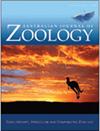Social interactions, roost usage and notes on the breeding system of the chocolate wattled bat (Chalinolobus morio) in south-east Queensland, Australia
IF 1
4区 生物学
Q3 ZOOLOGY
引用次数: 1
Abstract
Abstract. Little is known about the social behaviour of roosting insectivorous bats in Australia. Interactions between individuals and movements between multiple roosts at a building maternity site of the chocolate wattled bat (Chalinolobus morio) were examined using video observation and Passive Integrated Transponder (PIT) tagging, respectively. Bats of both sexes were seen to allogroom, which involved pairs of individuals simultaneously grooming each other around the face. This is the first occurrence of allogrooming reported between male vespertilionids, globally. In total, 366 bats were PIT tagged and analysis of movements revealed that bats exhibited a fission–fusion pattern of roost usage with sufficient switching among nearby roosts, such that all individuals were potentially able to associate and interact over a period of 150–200 days. Rates of roost fidelity varied markedly from 1 to 7.2 days of continuous occupancy of roosts, with females exhibiting slightly higher overall levels of fidelity over the nine-month monitoring period. The information gained from this study, when combined with results from other research, provides a sufficient basis for the description of the apparent breeding system for this species, where both males and females at the summer maternity roost are natally philopatric and mating takes place over winter in an expanded gene pool, comprising individuals that have dispersed from multiple summer maternity roosts.澳大利亚昆士兰州东南部的巧克力垂蝠(Chalinolobus morio)的社会互动、栖息地使用和繁殖系统注释
摘要人们对栖息在澳大利亚的食虫蝙蝠的社会行为知之甚少。采用视频观察和无源集成应答器(PIT)标记技术,分别研究了巧克力棘蝠(Chalinolobus morio)产房内个体之间的相互作用和多个栖息地之间的运动。研究人员发现,男女蝙蝠都会进行同种毛发梳理,即成对的个体同时为对方面部周围的毛发梳理。这是全球范围内首次报道的雄性卵磷脂之间的异源修饰。总共有366只蝙蝠进行了PIT标记,对运动的分析显示,蝙蝠表现出一种栖息地使用的裂变融合模式,在附近的栖息地之间有足够的转换,这样所有的个体都有可能在150-200天的时间内联系和互动。在连续占据栖息地的1至7.2天期间,巢穴保真率发生了显著变化,在9个月的监测期间,雌性的总体保真率略高。从本研究中获得的信息,结合其他研究的结果,为该物种的明显繁殖系统的描述提供了充分的基础,在夏季母巢的雄性和雌性都是天生的博爱性,交配在冬季在一个扩大的基因库中进行,其中包括从多个夏季母巢分散的个体。
本文章由计算机程序翻译,如有差异,请以英文原文为准。
求助全文
约1分钟内获得全文
求助全文
来源期刊
CiteScore
2.40
自引率
0.00%
发文量
12
审稿时长
>12 weeks
期刊介绍:
Australian Journal of Zoology is an international journal publishing contributions on evolutionary, molecular and comparative zoology. The journal focuses on Australasian fauna but also includes high-quality research from any region that has broader practical or theoretical relevance or that demonstrates a conceptual advance to any aspect of zoology. Subject areas include, but are not limited to: anatomy, physiology, molecular biology, genetics, reproductive biology, developmental biology, parasitology, morphology, behaviour, ecology, zoogeography, systematics and evolution.
Australian Journal of Zoology is a valuable resource for professional zoologists, research scientists, resource managers, environmental consultants, students and amateurs interested in any aspect of the scientific study of animals.
Australian Journal of Zoology is published with the endorsement of the Commonwealth Scientific and Industrial Research Organisation (CSIRO) and the Australian Academy of Science.

 求助内容:
求助内容: 应助结果提醒方式:
应助结果提醒方式:


